|
|
|
Sort Order |
|
|
|
Items / Page
|
|
|
|
|
|
|
| Srl | Item |
| 1 |
ID:
134835
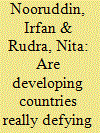

|
|
|
|
|
| Summary/Abstract |
This study evaluates the embedded liberalism hypothesis in a broad swath of less developed countries (LDCs). The authors find that LDC governments pursue a distinct welfare state policy that protects citizens from economic insecurities associated with global market expansion. Specifically, governments use public employment—and particularly employment in civil services and administration—to foster domestic stability alongside market expansion. However, such jobs are targeted to politically salient groups, not poorer groups that might also face increased economic uncertainty postopenness. In turn, public employment shores up public support for openness. The authors' findings suggest that free traders have reasons both to celebrate and to bemoan this LDC embedded liberalism compact. On the positive side, LDC governments are working hard to maintain political support for free trade; on the other hand, the compromise of protecting privileged groups at the expense of others in society raises questions about the long-term sustainability of their strategy.
|
|
|
|
|
|
|
|
|
|
|
|
|
|
|
|
| 2 |
ID:
168548


|
|
|
|
|
| Summary/Abstract |
Has the rise of large emerging economies influenced the foreign economic policies of smaller nations? Many of the BRICS' (Brazil, Russia, India, China, South Africa) dominance in export markets for low-skilled goods pose a particular challenge for “surplus-labor” countries characterized by large populations of unskilled and underemployed labor. We theorize the incentives of firms and governments in surplus-labor countries to form South-South preferential trade agreements (SSPTAs) as a means of diversifying and expanding trade relationships in the face of this challenge. Of all the BRICS, our findings show that China poses the greatest challenge; the countries forming the most South-South agreements are those whose exports have been most displaced by China. We verify this pattern using both systemic and country-specific measures of the China “shock.” Imports from China, in contrast, have no significant effect on SSPTA formation. Our account, which helps resolve the dual puzzle of declining trade with rich countries and the proliferation of SSPTAs in recent decades, underlines the implications of China's rise on the developing world.
|
|
|
|
|
|
|
|
|
|
|
|
|
|
|
|
| 3 |
ID:
178573


|
|
|
|
|
| Summary/Abstract |
In recent years, the volume and intensity of attacks on globalization have been steadily rising. It is frequently argued that the antiglobalization backlash stems from strains that have been placed on the compromise of embedded liberalism. We argue that existing research underemphasizes how technological change and the digital revolution have contributed to these strains. Global value chains facilitated by the digital revolution have linked technology in advanced industrial countries to low-cost labor in developing countries, precipitating distributional losses for low-skilled labor in the industrial world. Further, the digital revolution has led to regulatory challenges involving both capital and labor. We argue that, as a result, governments face both mounting opposition to globalization and heightened difficulty in supporting the programs and policies necessary to buffer the adverse domestic effects of globalization and maintain support for embedded liberalism.
|
|
|
|
|
|
|
|
|
|
|
|
|
|
|
|
| 4 |
ID:
145716
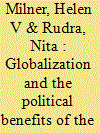

|
|
|
| 5 |
ID:
089820
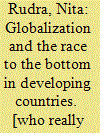

|
|
|
|
|
| Publication |
Cambridge, Cambridge University Press, 2008.
|
| Description |
x, 294p.
|
| Standard Number |
9780521715034
|
|
|
|
|
|
|
|
|
|
|
|
Copies: C:1/I:0,R:0,Q:0
Circulation
| Accession# | Call# | Current Location | Status | Policy | Location |
| 054319 | 303.482/RUD 054319 | Main | On Shelf | General | |
|
|
|
|
| 6 |
ID:
145715
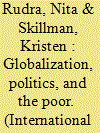

|
|
|
| 7 |
ID:
053517
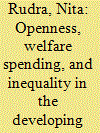

|
|
|
| 8 |
ID:
134497


|
|
|
|
|
| Summary/Abstract |
Are the BRICs driving a fundamental transformation of the world economy? Journalists, investors, policymakers, and academics alike prognosticate about the global impact of these large emerging economies. One camp deems the rise of the BRICs a challenge to America's hegemonic power, increasing global politico-economic instability as a result. Another camp defends the continuation of the American (and thereby, global) status quo with equal fervor. The BRICs, they argue, are mired in their own domestic challenges, mistrust one another, have little interest in leading global affairs, and have yet to command true followership by the rest of the developing world.
|
|
|
|
|
|
|
|
|
|
|
|
|
|
|
|
| 9 |
ID:
087993
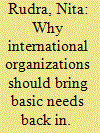

|
|
|
|
|
| Publication |
2009.
|
| Summary/Abstract |
An important milestone in the development debate is the recognition of poverty as a multidimensional phenomenon via the capabilities approach. However, a challenge remains in that many governments in less-developed countries continue to avoid prioritizing issues of absolute deprivation. This paper demonstrates how and why existing efforts to operationalize capabilities may distract policy makers from giving sufficient weight to issues of basic survival. We propose that international organizations can address this challenge through a method of triangulation: (1) identify how countries rank on universal goals of human development; (2) identify how countries rank on universal goals of basic needs provision; and (3) promote participatory poverty assessments. This approach ensures that absolute deprivation issues are addressed, and it establishes an acceptable (and necessary) balance between standardization and local complexity.
|
|
|
|
|
|
|
|
|
|
|
|
|
|
|
|
|
|
|
|
|